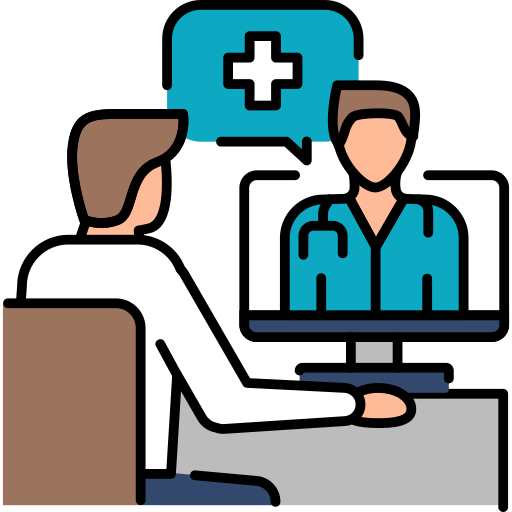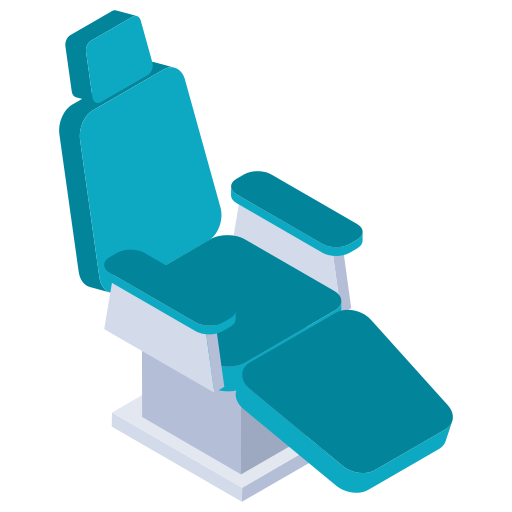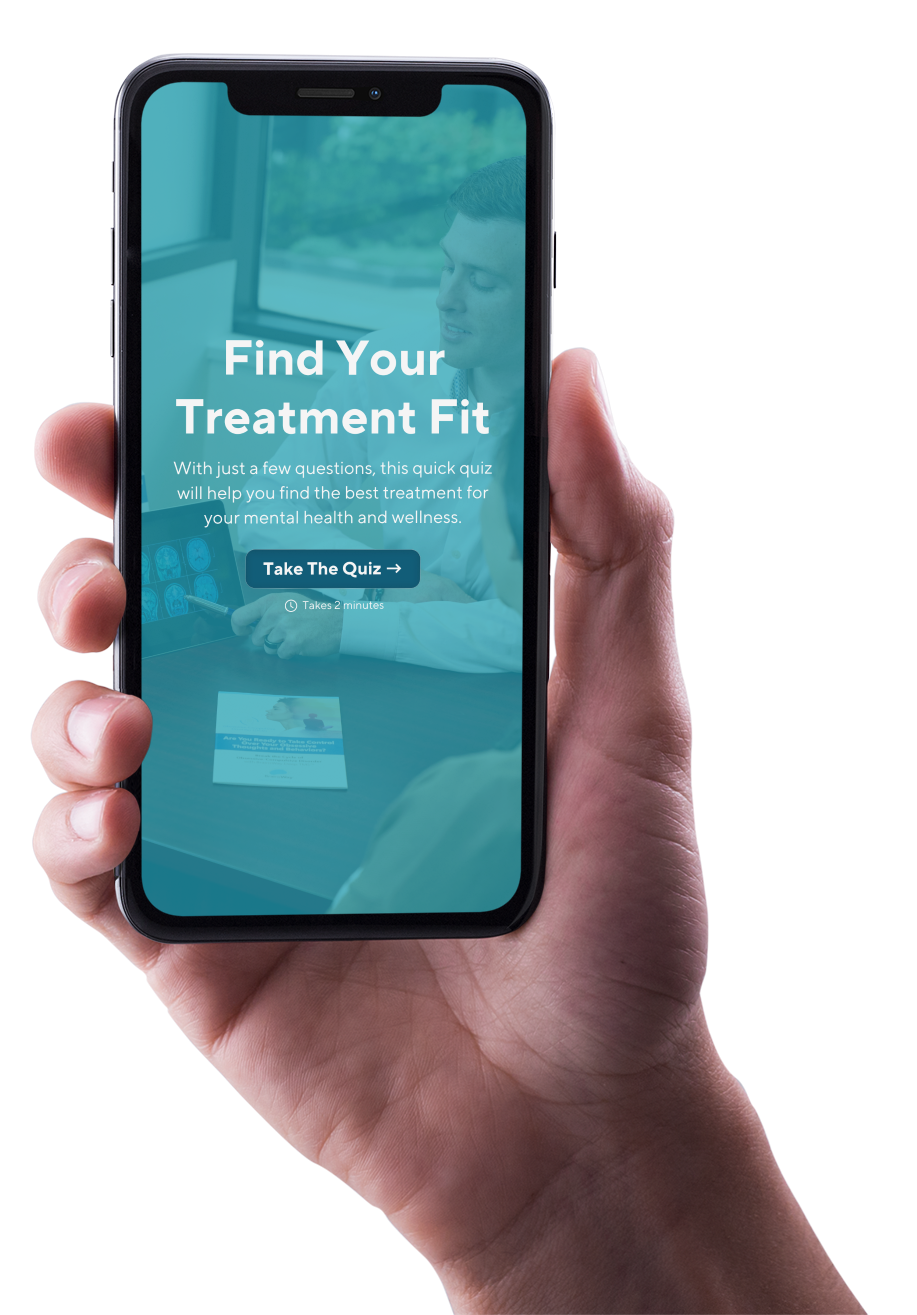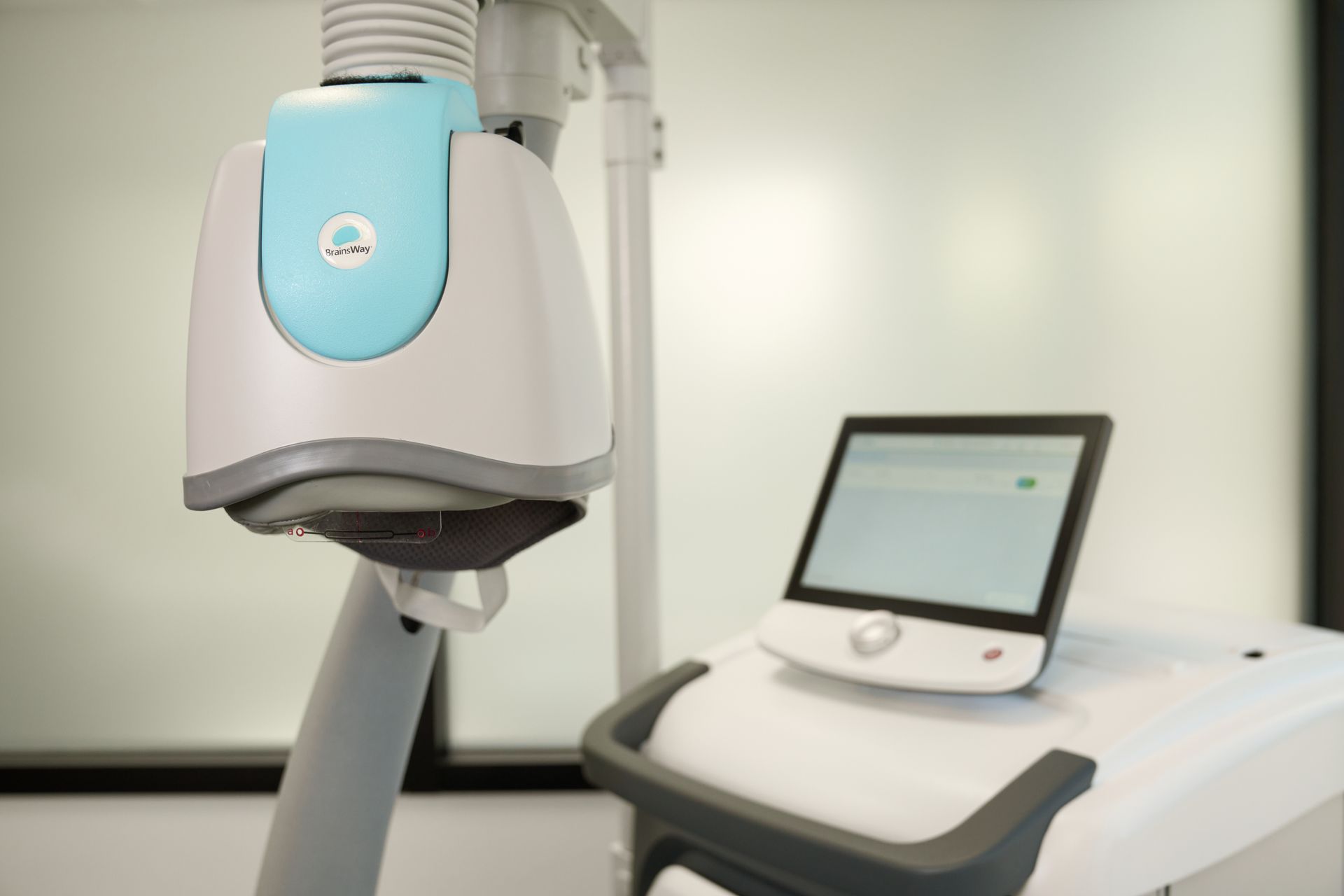Transcranial Magnetic Stimulation (TMS) is an FDA-approved cutting-edge mental health treatment that has seen many patients with depressive or obsessive-compulsive symptoms find relief (Iglesias, 2020). This alleviation of symptoms allows individuals to regain enjoyment in their everyday activities and enhance their quality of life.
TMS uses a magnetic coil to stimulate brain cells via an electromagnetic field with the aim of restoring healthy brain activity in regions that are associated with mental health symptoms specific to the patient (Siebner et al., 2022).
As is the case with many other forms of mental health treatment, there are multiple types of TMS treatments that offer various benefits. These include repetitive TMS (rTMS), deep TMS, accelerated TMS, and neuronavigation-guided TMS.
At Evolve Brain Health, we’re dedicated to guiding you through the complexities of TMS to help you make the best decision for your unique needs.
rTMS
Transcranial Magnetic Stimulation (TMS) is an FDA-approved cutting-edge mental health treatment that has seen many patients with depressive or obsessive-compulsive symptoms find relief (Iglesias, 2020). This alleviation of symptoms allows individuals to regain enjoyment in their everyday activities and enhance their quality of life.
TMS uses a magnetic coil to stimulate brain cells via an electromagnetic field with the aim of restoring healthy brain activity in regions that are associated with mental health symptoms specific to the patient (Siebner et al., 2022).
As is the case with many other forms of mental health treatment, there are multiple types of TMS treatments that offer various benefits. These include repetitive TMS (rTMS), deep TMS, accelerated TMS, and neuronavigation-guided TMS.
At Evolve Brain Health, we’re dedicated to guiding you through the complexities of TMS to help you make the best decision for your unique needs.
Deep TMS
Deep TMS is a type of rTMS that uses more advanced technology. Original TMS machines use a figure-of-8 coil which limits stimulation to more superficial layers of the brain. However, more modern designs implement a H-coil which allows for deeper regions of the brain to be stimulated. This can be beneficial as critical areas can be situated further below the surface of the cortex and H-coils may more accurately target the neurons, thus potentially leading to stronger outcomes (Levkovitz et al., 2015).
Similar to rTMS, a typical treatment protocol involves a 20-minute session five days per week over 4 to 6 weeks.
Accelerated TMS
This is an alteration in the schedule of TMS sessions as well as the technology used to deliver the electromagnetic pulses. It typically utilizes the H-coil to stimulate deep areas of the brain efficiently.
This protocol spans a week of treatment with 10 sessions per day, including breaks in between each session which allows for more rapid relief to be achieved. It may be better suited to individuals who are able to relieve themselves from everyday responsibilities for full-length days over a single week, compared to shorter periods per day over several weeks.
At Evolve Brain Health, we implement Brainsway H-coil to conduct the accelerated TMS protocol.
Neuronavigation-Guided TMS
Neuronavigation is an additional feature that can be implemented with various TMS protocols to provide added benefits.
Traditionally, the most common approach to identifying the area of stimulation was by locating a specific point on the skull and estimating the target location by measuring 5 cm from a point of reference. This was prone to inaccuracy due to the complexity of the brain compounded by individual differences. The result of stimulating regions that are, in reality, not the target region, is reduced effectiveness in treatment (Caulfield et al., 2022).
With neuronavigation, individual brains can be mapped to identify the location of specific neural structures. This allows for precise stimulation of intended regions as per an individual’s treatment plan and results in the effective reduction of mental health symptoms to allow patients to improve their quality of life and regain control of their mental health.
Which Type of TMS is Best?
Choosing a TMS treatment that is best for you may seem overwhelming. Here are some key factors to consider:
- Condition Severity: Patients with treatment-resistant depression may benefit from dTMS or accelerated TMS as more accurate brain stimulation and faster relief can be achieved.
- Lifestyle Needs: Those seeking gaster results may prefer accelerated TMS
- Precision of Stimulation: Neuronavigation-guided TMS is an excellent option for complex conditions or individuals requiring highly targeted treatments.
Why Choose Evolve Brain Health?
At Evolve Brain Health, we provide a variety of TMS options to suit individual patients’ needs. We utilize BrainsWay’s Deep TMS system and neuronavigation-guided TMS for standard deep TMS protocols and accelerated TMS protocols.
We prioritize patient-centered care, meaning every treatment plan is customized to your unique goals, combining cutting-edge science with compassionate care. Our free consultations allow you to explore your options with us and collaborate in the decision-making process for the best TMS type for your needs.
Take the First Step Today
Evolve Brain Health is committed to supporting you on your path toward better mental health. TMS may be the transformative treatment you are seeking.
Contact Evolve Brain Health to schedule your free consultation!
References
Caulfield, K. A., Fleischmann, H. H., Cox, C. E., Wolf, J. P., George, M. S., & McTeague, L. M. (2022). Neuronavigation maximizes accuracy and precision in TMS positioning: evidence from 11,230 distance, angle, and electric field modeling measurements. Brain stimulation, 15(5), 1192-1205.
Cotovio, G., Ventura, F., Rodrigues da Silva, D., Pereira, P., & Oliveira-Maia, A. J. (2023). Regulatory clearance and approval of therapeutic protocols of transcranial magnetic stimulation for psychiatric disorders. Brain sciences, 13(7), 1029.
Iglesias, A. H. (2020). Transcranial magnetic stimulation as treatment in multiple neurologic conditions. Current neurology and neuroscience reports, 20, 1-9.
Levkovitz, Y., Isserles, M., Padberg, F., Lisanby, S. H., Bystritsky, A., Xia, G., ... & Zangen, A. (2015). Efficacy and safety of deep transcranial magnetic stimulation for major depression: a prospective multicenter randomized controlled trial. World Psychiatry, 14(1), 64-73.
Siebner, H. R., Funke, K., Aberra, A. S., Antal, A., Bestmann, S., Chen, R., ... & Ugawa, Y. (2022). Transcranial magnetic stimulation of the brain: What is stimulated?–A consensus and critical position paper. Clinical Neurophysiology, 140, 59-97.











